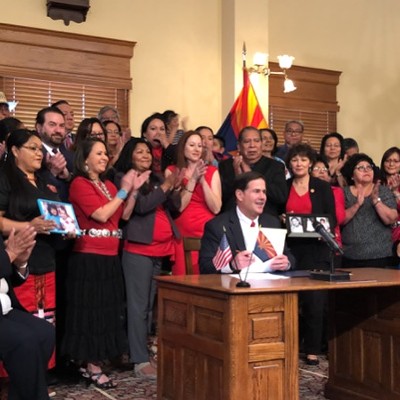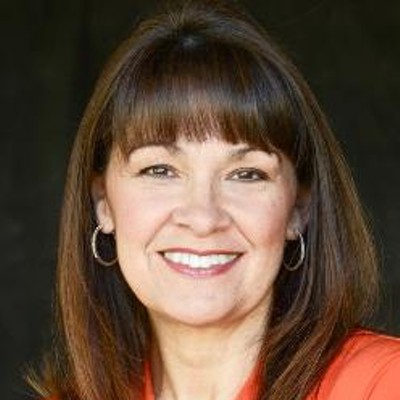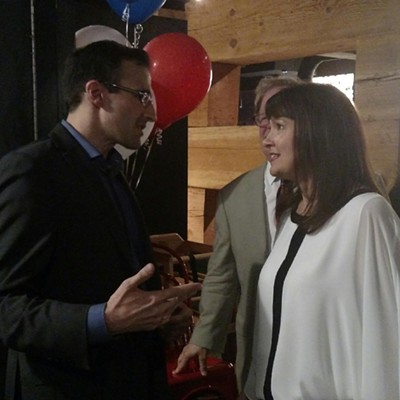Even the most-informed voters in Tucson's new Legislative District 9 would be hard-pressed to find substantial policy differences between the three Democratic candidates running for two open seats in the state House.
Mohur Sidhwa, Dustin Cox and Victoria Steele all agree, for instance, that Arizona needs to close its tax loopholes, fund education better and provide a robust health-care system for the poor.
And they all agree that because the candidates are so similar on the issues, primary-election voters will base their decisions mostly on background, style and personality—and that's where their differences start to emerge.
Sidhwa has the advantage of having met many of the LD 9 voters before the 2010 election, when she was walking the streets of midtown Tucson asking for votes. She lost a primary by less than 500 votes and vowed to try again.
The new district—which has a 4 percent Democratic edge in voter registration and runs from Interstate 10 through the foothills and northside to the Sabino Canyon area in the east, and dips down to Speedway Boulevard in midtown Tucson—includes much of the district in which she ran last time.
"When I saw the margin of loss ... I thought to myself, 'I love this place,'" she says. Voters "were willing to put aside any concerns they might have had about someone with a funky name, and that was a hurdle that a lot of people thought I could not overcome."
Sidhwa is a Constitution-thumping immigrant from India who said she came to America in search of freedom and democracy. Sidhwa says she has invested her life in local politics because of her deep respect for the democratic system.
She has a background in the sciences, and her pet issue is getting more science into the classroom and "dragging the Legislature into the 21st century."
After 30 years of advocacy and following politics, she is a bona fide legislative geek with plenty of friends in the halls of the Capitol.
"I can hit the ground running, because I know the players, especially the behind-the-scenes players, and that makes a difference," she says. "Arizona has enough problems without (lawmakers) having to learn on the job."
Although Victoria Steele is running her first campaign for public office, Tucsonans may remember her as an anchor on KNST AM 790's morning news, where she was the "resident liberal."
She tells a story about the first time she got involved in politics—by punching a bully classmate in the nose. To get out of telling her parents about after-school detention, she told them she was staying late to run for the student council. She actually ran, won the election, and later got sex education introduced at her high school.
Steele founded Native Ways, a program for Native American women with substance-abuse problems, and now owns her own counseling practice. She also works at both the University of Phoenix and Prescott College.
She decided to throw her hat into the political arena after noticing her counseling patients' problems were exacerbated by lawmakers' decisions.
"As I started doing private counseling, I noticed, wow, everyone who is coming to talk to me about their problems, these problems are connected to what's happening on the state level," she says.
She has picked up a pack of endorsements from heavy-hitting Tucson Democrats like City Council members Regina Romero, Richard Fimbres and Karin Uhlich; Pima County supervisors Ramón Valadez and Richard Elías; and state Rep. Bruce Wheeler.
She said she is inspired by the "Arab Spring" and is trying to connect with voters via social media. She hopes to pull support from her students, clients and people she has met over the years.
"Just because I haven't been on the public scene (recently) doesn't mean people don't know me," she says. "People know me. I've been building relationships all along. But a lot of what I do is behind closed doors with clients one-on-one."
Dustin Cox, the former head of nonprofit Anytown Arizona who now owns his own consulting business that works with nonprofits, made his first run for office in 2010, when he came in fifth in an eight-way primary for two open House seats.
He decided to run again, because having two open seats in a district is rare, and he couldn't pass up the opportunity.
Though he is the youngest candidate in the race, Cox says his experience balancing multi-million-dollar budgets and turning a declining nonprofit into a thriving one while saving and creating jobs makes him the most-electable candidate at a time when the economy is suffering, and people are worried about jobs more than party ideology.
"I'm really just concerned with solutions," he says. "I don't care if it's a Democratic, Republican or independent idea; if it's a good one that's going to create jobs, save our public education system and put Arizona back on track, then I'm all for it."
In a competitive district like LD 9, Cox says voters want a moderate Democrat who can work across the aisle and win a general election. He has picked up endorsements from notable Republicans like former U.S. Rep. Jim Kolbe and former state lawmaker Pete Hershberger, as well as from Democrats like former Attorney General Terry Goddard.
Cox has a strong competitive streak and says he learned a few things in the last election. This year, he's running a hard campaign with a team of volunteers knocking on doors and getting out his message, which he says will make the difference.
"At the end of the day, it's really about who's running the best campaign on the ground," he says. "I don't think anyone can say they've worked harder than my campaign volunteers have or I have. I think voters are going to know me well."
Early voting begins Aug. 2, and the primary election is on Aug. 28.












